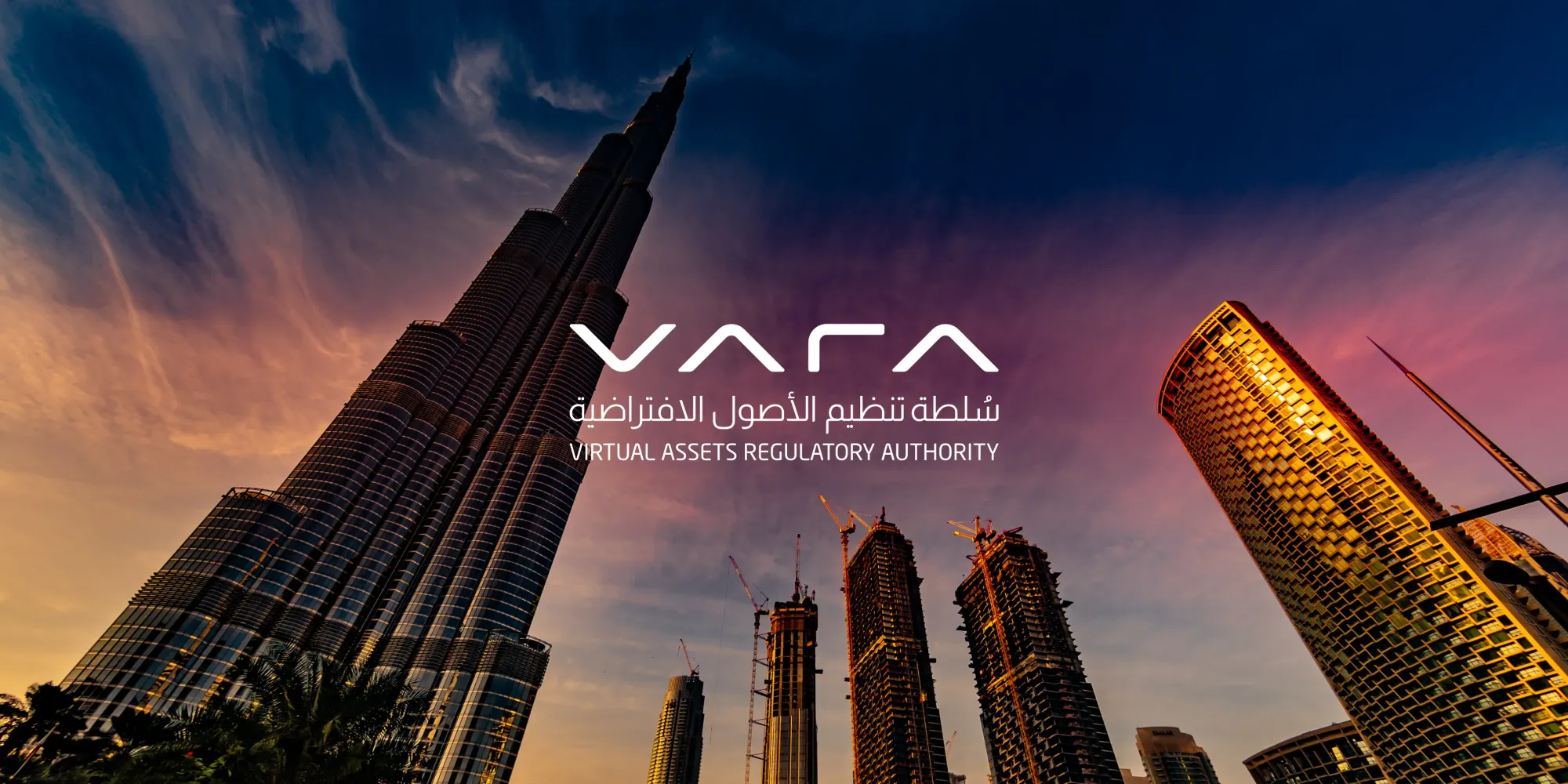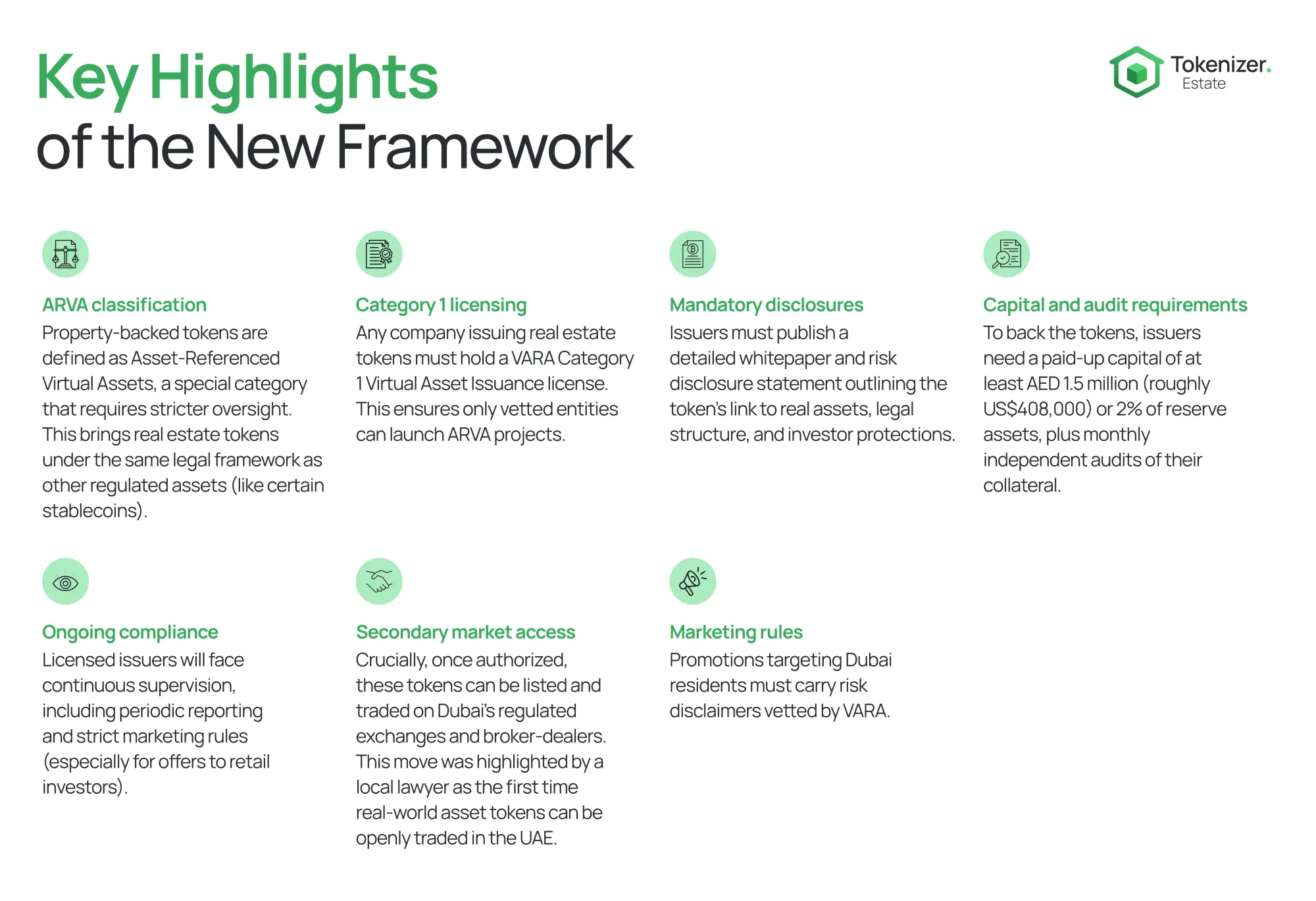Dubai’s New Real Estate Tokenization Rules. 19 June 2025 Update
Breakdown of Dubai’s 19 June 2025 rules on real-estate tokenization: licensing, KYC/AML, asset caps and key compliance steps for issuers.

Dubai has officially brought real estate investment into the blockchain era: Dubai’s regulators have published clear rules for real estate tokens, bringing property deals onto the blockchain. As of 19 June 2025, Dubai’s Virtual Assets Regulatory Authority (VARA) requires virtual-asset firms to comply with an updated rulebook that covers tokenized real-world assets. In practical terms, this means developers can issue property-backed digital tokens and trade them on licensed platforms under a new, transparent framework. The launch of these rules marks a milestone in tokenization in Dubai, aligning the booming property market with cutting-edge digital finance.
Dubai’s skyline reflects its ambition: a high-tech hub where real estate meets blockchain. In mid-May 2025 VARA announced Version 2.0 of its activity-based rulebooks (including the Virtual Asset Issuance Rulebook) and gave firms 30 days to adjust. By 19 June, all licensed crypto firms must comply with the new framework. Key changes include stronger oversight of trading activities (margin trading, custody, etc.) and a unified definition of terms across services. Crucially, the issuance rulebook now explicitly covers Asset-Referenced Virtual Assets (ARVAs) – tokens backed by real-world assets like property. Under the update, exchanges and broker-dealers can list and distribute these ARVA tokens legally in Dubai. In short, tokenized real estate is no longer a gray area: Dubai now has written rules for issuing and trading it.
Background: Dubai’s Path to Property Tokenization

Dubai has been laying the groundwork for this shift for years. In 2017 the city launched a broad blockchain strategy, and in 2024 the Dubai Land Department (DLD) began a pilot to tokenize actual properties. That project – covered in our blog – paired the DLD with VARA so that digital tokens would be “covered by both property law and digital asset rules”. In other words, Dubai has been integrating real estate titles and smart contracts into one legal system. The June 2025 updates build on this foundation. By formally recognizing real-estate tokens as ARVAs, the new rules create a clear link between ownership deeds and digital tokens. Investors gain legal protection and transparency, while projects like government-backed platforms (e.g. Prypco Mint on the XRP Ledger) can operate with regulatory approval. As a result, Dubai continues to turn blockchain pilots into scalable infrastructure.
What Changed on 19 June 2025?
VARA’s announcement highlighted that all activity-specific rulebooks were revised. For virtual asset issuance, Version 2.0 of the rulebook (effective 19 June 2025) includes the following high-level updates: a unified set of definitions for key terms (client assets, collateral, etc.), stricter controls on margin trading and token distribution, and a harmonized compliance regime across services. The 30-day transition period (ending 19 June) ensures firms have time to update procedures. Importantly for real estate, the rulebook now officially treats property-backed tokens as ARVAs. This means any token that “represents direct or indirect ownership” of real assets and aims to maintain stable value by reference to those assets is covered by the new rules. In practical terms, the issuance and trading of real-estate tokens require a full VARA license and oversight.
Key Highlights of the New Framework

- ARVA classification: Property-backed tokens are defined as Asset-Referenced Virtual Assets, a special category that requires stricter oversight. This brings real estate tokens under the same legal framework as other regulated assets (like certain stablecoins).
- Category 1 licensing: Any company issuing real estate tokens must hold a VARA Category 1 Virtual Asset Issuance license. This ensures only vetted entities can launch ARVA projects.
- Mandatory disclosures: Issuers must publish a detailed whitepaper and risk disclosure statement outlining the token’s link to real assets, legal structure, and investor protections.
- Capital and audit requirements: To back the tokens, issuers need a paid-up capital of at least AED 1.5 million (roughly US$408,000) or 2% of reserve assets, plus monthly independent audits of their collateral.
- Ongoing compliance: Licensed issuers will face continuous supervision, including periodic reporting and strict marketing rules (especially for offers to retail investors).
- Secondary market access: Crucially, once authorized, these tokens can be listed and traded on Dubai’s regulated exchanges and broker-dealers. This move was highlighted by a local lawyer as the first time real-world asset tokens can be openly traded in the UAE.
- Marketing rules: Promotions targeting Dubai residents must carry risk disclaimers vetted by VARA.
Why Now? Dubai’s Strategic Timing
| Factor | Significance |
|---|---|
| Market demand | Rapid sell-outs on platforms like Prypco Mint ($399M in May 2025) |
| Economic importance | Real estate = ~25% of Dubai’s GDP |
| Cross-border flows | Tokenization enables fast international capital movement |
| Risk management | New rules add safeguards against misuse and fraud |
Dubai's focus on property tokenization reflects both market demand and systemic importance. The rapid sell-outs of early tokenized property listings, such as those on Prypco Mint, have shown significant global investor interest. For instance, in May 2025 alone, Prypco Mint facilitated approximately $399 million in tokenized property sales, representing nearly 17% of Dubai's real estate transactions for that month. This demonstrates a substantial appetite for fractional real estate investments, underlining the need for clear regulatory guidelines to manage this booming sector responsibly.
Moreover, real estate constitutes about a quarter of Dubai’s GDP, reinforcing the critical need for rigorous oversight before scaling tokenization efforts into the billions. Tokenized real estate's capability to rapidly facilitate cross-border capital flows further accentuates the need for stringent safeguards against illicit activities and misrepresentation, which VARA's updated regulations explicitly address.
Industry Impact and Outlook

Dubai’s explicit tokenization rules significantly boost market innovation by eliminating legal ambiguities. Developers, investors, and asset managers globally can now confidently engage in Dubai’s real estate market through digital tokens. Already, high-profile tokenization projects like the $3 billion Ritz-Carlton Residences deal showcase the potential for attracting international investors via secure, regulated platforms.
Yet, the regulatory environment remains prudently cautious. High capital requirements, frequent audits, and detailed compliance rules initially position these tokenized offerings primarily towards professional and accredited investors, aligning with Dubai's status as a global financial center.
As VARA’s structured approach becomes a template for other international financial hubs, Dubai’s initiative may influence global standards in real estate tokenization. The emirate’s successful integration of blockchain technology with traditional real estate laws, as documented in our detailed exploration on our blog, demonstrates a scalable model for other jurisdictions looking to follow suit.
Dubai’s June 2025 regulatory updates formally bring real estate into the crypto age. By defining tokenization in Dubai as a regulated activity and providing a clear path to issuance and trading, the new rules transform a high-tech vision into policy. The city remains a testing ground and model: investors and developers should stay informed (and licensed) if they want to participate.
Stay informed.
Subscribe to blog.tokenizer.estate for expert insights, real-world case studies, and the latest updates in real estate tokenization 🏠

